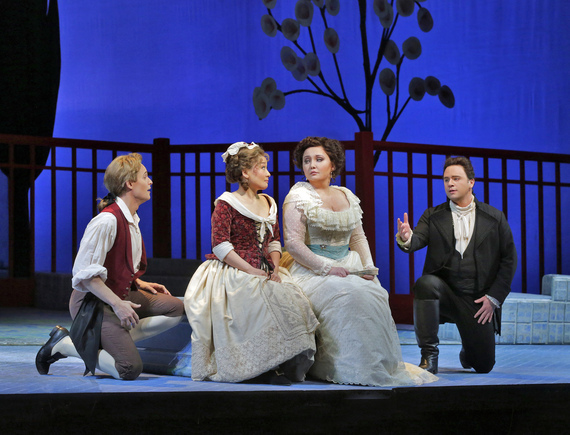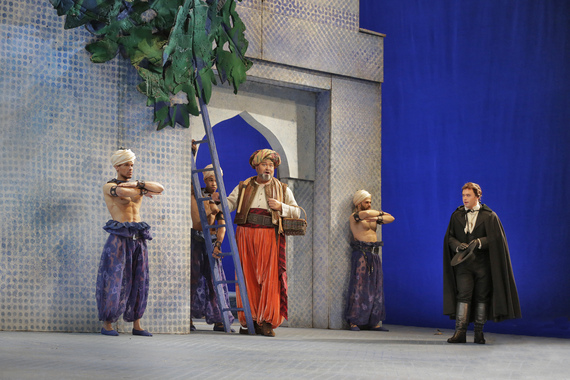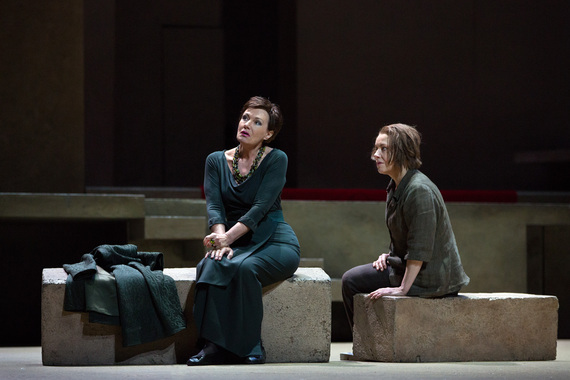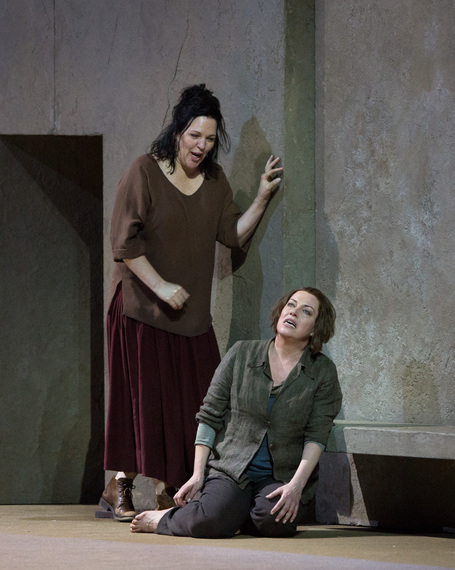There's something in the water over in the Mediterranean. From the sunny shores of Turkey (as seen in Wolfgang Amadeus Mozart's Die Entfürung aus dem Serail, The Abduction from the Seraglio, l that opened on Friday) to the bleak, devastating palace in Mycenae (where Richard Strauss' Elektra unfolds in a radically innovative new production that opened last week and I took in last night), laudable music and taut theatrics are the common denominator between two very disparate pieces both seeing strong presentations at the Met.
First was Entfürung, Mozart's charming 1782 experiment in Orientalism. In the Singspiel (an opera in which intermittent bits of spoken dialogue do the most to propel the plot), Konstanze, her servant Blondchen, and Pedrillo, the servant of Konstanze's betrothed, Belmonte, have been kidnapped and sold into the service of the beneficent Pasha Selim. Konstanze, still faithful to Belmonte, is the sullen gem of Selim's harem, while Blondchen and Pedrillo have ingratiated themselves into Selim's presence despite the presence of Osmin, the comically self-important overseer of Selim's household. Belmonte arrives and conspires with Pedrillo to steal the two ladies away from Selim's palace and back to Spain, but when Osmin catches them and alerts Selim, the Pasha decides to relinquish his beloved Konstanze to her Belmonte, saying "She who cannot be won by kindness must be set free" and sending the quartet of lovers on their way. It's one of Mozart's most easily-digestible operas (unless, of course, you're watching Calixto Bieto's 2004 human trafficking-inspired production), but requires strong singers with strong comic presences to carry the show.
When it comes to strong singing and equally strong comedics, Hans Peter-König set the standard for the night. His deliciously-even low bass fit Osmin's music like a glove and he mined the music for all its inherent comedy. Physically, he towered over most of the singers (especially the petite Kathleen Kim at Blondchen), creating a much-appreciated sight gag. Going toe to toe with him when Osmin alleges that the Pasha gifted Blondchen to him as a servant, Kathleen Kim's bright, clear coloratura soprano twinkled and floated easily into the house despite a few underpowered high notes in her first aria.
Konstanze (named so after Mozart's wife, Constanze Weber) is the prima donna of the show, and she was ably taken on by Russian soprano Albina Shagimuratova. Konstanze is an oddly structured role made up of technically-demanding, stand-alone arias and limited ensemble singing, all of which Shagimuratova sang well. Her bright, soft-grained, focused voice moved through the music like a moonbeam, but the overall interpretation was marred by a lack of smart (or much of any) phrasing, interesting expression of the text, and uncreative stock gentures. Her aria "Ach ich liebte," a lament of Konstanze's lost love, here came across as more of a laundry list of miseries. However, she hit absolutely all the notes (including some shimmering high C's and D's) and sang with admirable security throughout the entire evening. Her vehemently-sung "Marten aller arten," with all its deftly-executed coloratura runs, was the musical highlight of the evening.
Paul Appleby, a singer who can consistently be relied on for sensitive, elegant singing of lyric tenor roles, must have been having an off night. His opening aria "Hier soll ich dich denn sehen" finished stronger than it started and he really shone in his second act aria and third act duet with Shagimuratova, but he ran out of steam towards the end of the evening and it was, overall, a lower-impact interpretation than expected from a singer whose refined singing and phrasing made him the undeniable star of last season's The Rake's Progress. While one can never predict anything with certainty, I imagine his interpretation will tighten up over the next two weeks. His servant Pedrillo, in love with Blondchen, was sung by the likable Brenton Ryan who brought a substantial tenor, taut high notes, and a wiry physique perfect for the production's physical comedy.
Matthias von Stegmann was a pleasant and pouty Pasha Selim, though his work as the sole writer and director of the German dialogue for The Simpsons sounds much more interesting.
James Levine has long been a champion of Entfürung at the Met. In fact, he has lead almost every revival of this production since its premiere. With Levine's imminent leaving of his "Music Director" role in light of his physical ailments, it has become necessary to adjust to a different standard for Levine's conducting. This Entfürung showed all the characteristics of that "new normal": a lack of consistent incisiveness, intermittent pacing issues between the orchestra and the singers, and just a hint of trepidation across the board. However, the cheerfulness of the orchestration, in particular the pleasant use of "Turkish" percussion, were all diligently preserved and the result was the most clean, easy-moving Levine performance I have seen since the onset of his Parkinsons. There were even some moments where it even sounded like the old Levine was back in the pit. It wasn't perfect, but even considering his limitations, it was pretty darned good.
John Dexter's production, directed with the utmost care and precision at all levels by Stephen Pickover, is never heavy-handed but remains charmingly old-fashioned. Jocelyn Herbert's papery sets can't have looked any more vintage at their premiere in 1979, but they're pretty and evocative, just like her costumes. Gil Wechsler's lighting is a "50 Shades of Blue" affair, but what better to evoke a cloudless Mediterranean sky?
Such a cloudless Mediterranean sky steers clear of Agamemnon's Mycenaen palace, though. Patrice Chereau's riveting, unconventional take on Strauss' shattering one-act shocker about revenge amidst familiar strife, recreated by stage director Vincent Huguet, several original cast members, and the original conductor (Esa-Pekka Salonen), is new to the Met this season following Chereau's untimely death due to cancer, and it's here with a quiet, clear-eyed vengeance.
Strauss' 1909 Elektra, featuring a libretto by Hugo von Hofmannstahl after his own 1903 play, is a modernist take of the myth of Elektra, an ancient Greek princess overcome with a thirst to avenge the murder of her father, Agamemnon, by her mother, Klytämnestra, and step-father, Aegisth. In Chereau's production, all of the usual hysterical excesses are stripped away to create a streamlined, believable, deeply affecting and humanizing production that shows this piece to be infinitely more versatile than it is given credit for.
In this Elektra, the title character isn't an unfettered animal, the maids aren't idle gossipers, and Klytämnestra is far from the cackling, amulet-toting harridan she usually is. What makes this production work is the familiar emotions injected into it: cruelty, sympathy, mourning, and anger. There is a clear family dynamic here and when Klytämnestra sings of her obsession with rituals, it seemed more like the rituals of everyday life that captivate her more than any ritual sacrifice. This sense of normality made the opera's gripping conclusion, where two bodies litter the stage and Elektra sits in an exhausted catatonia, even more disturbing and unexpected. Is Elektra still a little off-center? Of course, but it's in no way unbelievable. Strauss denied that his opera was ever affiliated with the idea of an "Elektra complex," and here, the idea was not that Elektra mourned her father because of a deep-seated attraction to him, but because he, unlike the vicious maids and Klytämnestra, may have been the only one in Elektra's life who ever treated her like a human being worthy of love and attention.
It's hard to discuss the production, though, without acknowledging Esa-Pekka Salonen, whose fluid, sprightly conducting presented a new outlook on a work that normally runs at a relentless full-throttle. In his Ten Golden Rules (for the album of the young conductor), Strauss wrote that Elektra should be conducted as if it were "fairy music." Salonen took this to heart, but still imbued drama through varied dynamics, well-placed and well-defined musical climaxes, and expert coordination between the pit and the stage to create a savagely-delicate result. It was an unforgettable reading of the score that revealed new insights at every turn and a welcome counterpoint to the more traditional Elektra New York audiences saw when Andris Nelsons lead the Boston Symphony Orchestra at Carnegie Hall in October.
The Met has been late in engaging Nina Stemme, an established Swedish dramatic soprano in her prime. She has been singing the usual dramatic soprano roles (Brünhilde, Turandot, Isolde, etc.) around Europe for years, but this is only her second production of Strauss' titular heroine. This didn't seem to matter, though, as Stemme moved through the part with undaunting stamina and secure singing from start to finish that never grated on the ear. Her steely, mocha-colored voice negotiated the turbulent music with ease. Aided she was by the production and Salonen's unique reading of the score in that some high notes which would have been full-throated and earth-shaking in a less-exacting production were here softly and delicately-sung as part of an interpretation that was the most musical I have heard.
She was well-matched by Adrianne Pieczonka (original to the Aix-en-Provence production) as Chrysothemis, Elektra's sympathetic sister and social opposite. Pieczonka's voice has a vaguely-pinched quality to its middle and upper registers, but she boasts a pungent lower voice and moved with fluidity and purpose onstage. Her desperate, yearning characterization, whether it was for a simple life in the country or for Elektra to just come inside, was affecting and genuine.
Waltraud Meier is one of the few opera singers to carry the distinction of being a real "singing actress" and her cool, cruel Klytämnestra did just that. She cut a glamorous figure in a plain black dress and overcoat, but her acting was terrifying, especially in her entrance, a simple, chilling moment of prolonged eye contact with Elektra, that elicited gasps from the audience. Vocally, she isn't quite the over-the-hill mezzo one normally sees in this part, though her high and low notes were more remarkable than her middle voice. In her tense duet with Elektra, she made the most of the opera's text and propelled the scene to its brutal end.
Eric Owens' Orest was well-sung with a large, authoritative voice if not quite at the same level as the other principals. In the Recognition Scene, though, he clicked with Stemme and a moment that can normally drag became a musical and dramatic highlight. In the reimagined role of the Fifth Maid, Met veteran Roberta Alexander, last seen at the house in 1991, brought a warm, worn, resonant voice to the character that has been with Elektra's family from the beginning. Also of note was Kevin Short's commanding turn as Orest's Guardian, singing music that is usually just declaimed. Burkhard Ulrich's Aegisth was sung capably with an admirable high-tenor.
Richard Peduzzi's sets depicted well the bleakness of the palace as well as allowing the singers to make use of every part of the stage. The costumes, by Caroline de Vivaise, are pretty dowdy across the board for all the women (Elektra is the only woman not in a skirt/dress), but they get the job done. Dominique Brugière's lighting tended to keep it dark onstage, but it's hard to imagine Elektra unfolding in the same sun-drenched courtyards as Entfürung.
Both productions featured the Met Orchestra and Chorus in top form, responding readily to the nuances of the two conductors.
They may make a mismatched pair, but both Entfürung and Elektra (especially Elektra) are being executed with great care at the Met. With the Met's season's ending in two weeks, make it a priority to take in the Mediterranean madness.
Tickets for Die Entfürung aus dem Serail are available here and tickets for Elektra are available here. Elektra will be presented in movie theaters as part of the Met's Live in HD series this upcoming Saturday.
Photos by Ken Howard and Marty Sohl



